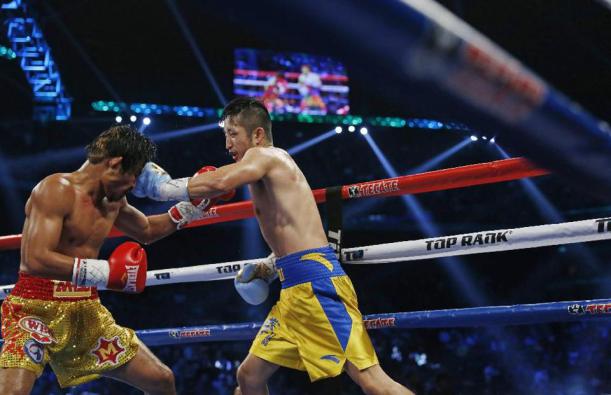Bob Arum learned something about Chinese fans earlier this year at his company’s first fight card in Shanghai, where the crowd yelled and cheered for the home country boxers all the way up until the main event.
Then, with no Chinese fighter in the ring, they suddenly went quiet.
”There was nothing,” Arum said. ”Halfway through the fight half the crowd walked out.”
That they stayed that long is an indication that Chinese fans are at least beginning to understand a sport once banned in the country. That wasn’t the case in April last year when two-time Olympic gold medalist Zou Shiming made his pro debut and professional boxing made its debut in this gambling enclave.
”The first show we did with Zou you could have heard a pin drop,” the longtime promoter said. ”They didn’t know how or when to cheer or seem to understand much about it.”
Things were much louder Sunday morning when Zou was the featured undercard fighter as Manny Pacquiao returned to the ring in the main event to win a lopsided decision over Chris Algieri. The arena at the massive Venetian resort was filled with bleary-eyed gamblers long before the main event, though many of them were non-Chinese.
”The fact it’s on in the morning doesn’t seem to matter,” said Ed Tracy, president and CEO of the Venetian. ”Most of them have been up all night anyway.”
On part of the state sanctioned CCTV network, millions tuned into a broadcast that, unlike in the U.S., was free of charge.
If boxing isn’t exactly exploding in China, there’s little doubt it’s beginning to find its own niche. Pacquiao and Algieri helped fill hotel rooms at the Venetian over the weekend and bring in millions of dollars in extra revenue from visitors as eager to spend money in the resort’s lavish shopping mall as they were in the crowded casino.
It’s not Las Vegas, but the concept is the same. Just like the casinos here began as copies of Vegas resorts, the fights follow the same pattern of appealing to sports fans with deep pockets who enjoy a wager or two.
And Chinese fans are not only learning when to cheer, but how long to stay.
”They’re beginning to know boxing,” Arum said. ”It’s a relatively easy sport to understand, which is part of its beauty. But it’s really a universal thing. And the Chinese people are becoming boxing fans.”
Zou is undoubtedly the biggest reason for that. He won gold medals in 2008 at home in Beijing and in 2012 in London, becoming a national name in the process and introducing the sport to millions of Chinese more accustomed to martial arts contests.
Still, when Arum was first presented with the idea of paying big money to the 112-pounder making his pro debut, he had to think twice about it. With a chance to enter the potentially lucrative Chinese market, he ponied up $300,000 for Zou to fight in a four-rounder.
Zou has fought all five of his pro fights at the Venetian, and reportedly has drawn the attention of Chinese president Xi Jimping. After winning Sunday against a previously unbeaten Thai fighter, the plan is to have him fight for a title as a headliner in the same arena.
”You can look for a very, very different event then that is going to be very Asian centric,” Tracy said. ”It’s a hell of an opportunity for us to put on a very good show.”
Zou wasn’t the only home-grown fighter on Sunday’s card. Rex Tso from neighboring Hong Kong improved to 15-0 a super flyweight, while 154-pounder Macau native Kuok Kun Ng also won. The Chinese boxing roster isn’t exactly deep, but it’s growing relatively fast.
Pacquiao also seems quite at home here, where he doesn’t have to battle the effects of jet lag to Las Vegas. His 350-member entourage managed to cram on two planes last week for a short flight from the Philippines to watch their own national hero, who was guaranteed more than $20 million and didn’t have to pay millions in taxes that would come due from a fight in the U.S.
That doesn’t mean Macau will get the biggest fights. It won’t, even if they involve Pacquiao, who Tracy envisioned fighting three of his last five fights in Macau when he made the deal with Arum.
The lights of the Las Vegas Strip still shine brightly when it comes to the biggest events. But China may someday get its share, too.
